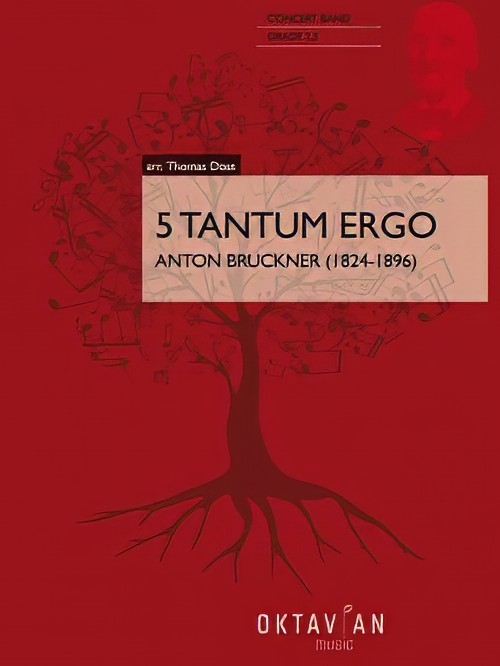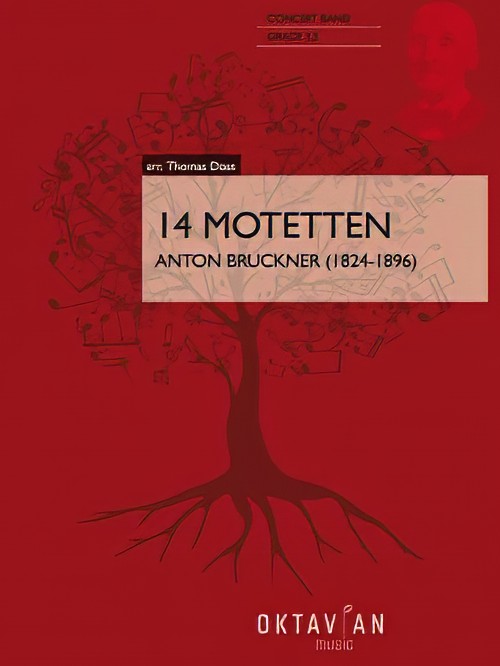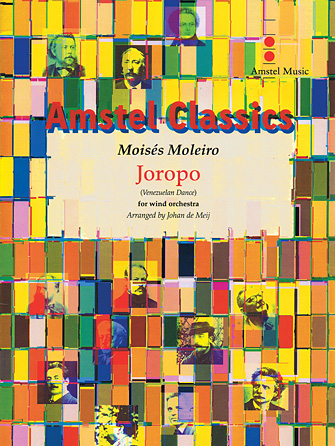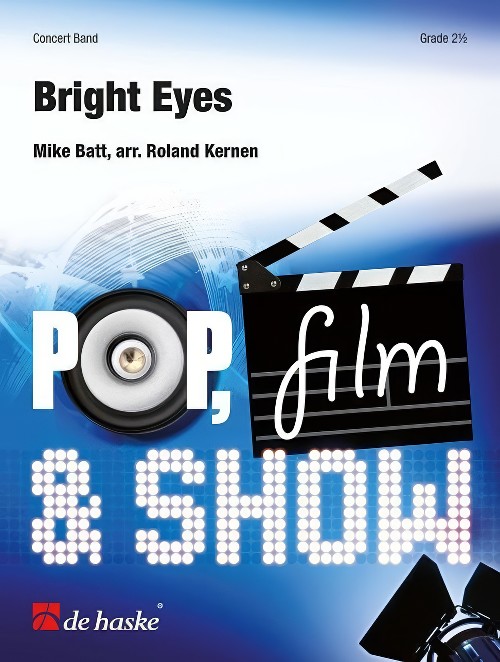Results
-
 £95.99
£95.995 Tantum Ergo (Concert Band - Score and Parts) - Bruckner, Anton - Doss, Thomas
Anton Bruckner (b. 4.9.1824, Ansfelden, d. 11.10.1896, Vienna) didn't have it easy. Throughout his life, the Austrian composer was plagued by self-doubt. Anton Bruckner came from a simple, rural background. After the death of his father, he was accepted as a choirboy at the monastery of Sankt Florian in 1837. After several years as a school assistant and his own organ and piano studies, he first worked as organist in St. Florian, then from 1855 as cathedral organist in Linz. Introduced to music theory and instrumentation by Simon Sechter and Otto Kitzler, he discovered Richard Wagner as an artistic role model, whom he admired throughout his life and also visited several times in Bayreuth. In 1868 Anton Bruckner became professor of basso continuo, counterpoint and organ at the Vienna Conservatory; ten years later court organist; and in 1891 finally honorary doctor of the University of Vienna. He was considered an important organ virtuoso of his era, but had to wait a long time for recognition as a composer. It was not until Symphony No.7 in E major, composed between 1881 and 1883, with the famous Adagio written under the effects of Wagner's death, that he achieved the recognition he had hoped for, even if he was reluctant to accept it given his inclination towards scepticism and self-criticism. Anton Bruckner was a loner who did not want to follow a particular school or doctrine. He composed numerous sacred vocal works, such as his three masses, the Missa Solemnis in B flat minor (1854), the Te Deum (1881-84) and numerous motets. As a symphonic composer, he wrote a total of nine symphonies and many symphonic studies from 1863 onwards, tending to revise completed versions several times over. Bruckner's orchestral works were long considered unplayable, but in fact were merely exceptionally bold for the tonal language of their time, uniting traditions from Beethoven through Wagner to folk music, on the threshold between late Romanticism and Modernism. Hymns for four-part mixed choir a cappella (1846, St. Florian) No. 1 in E flat major (WAB 41/3): Quite Slow No. 2 in C major (WAB 41/4): Andante No. 3 in B flat major (WAB 41/1): Slow No. 4 in A flat major (WAB 41/2): Slow Hymn for five-part (SSATB) mixed choir and organ No. 5 in D major: Solemnly They are simple works, completely subordinate to their liturgical use, which nevertheless already show numerous characteristics of personal expression. These small pieces were able to stand up to the harsh scrutiny of the mature master: in 1888, Bruckner subjected them to a revision in which he made only minor corrections.Duration: 11.00
Estimated dispatch 7-14 working days
-
 £256.00
£256.0014 Motetten (Concert Band - Score and Parts) - Bruckner, Anton - Doss, Thomas
Anton Bruckner (b. 4.9.1824, Ansfelden, d. 11.10.1896, Vienna) didn't have it easy. Throughout his life, the Austrian composer was plagued by self-doubt. Anton Bruckner came from a simple, rural background. After the death of his father, he was accepted as a choirboy at the monastery of Sankt Florian in 1837. After several years as a school assistant and his own organ and piano studies, he first worked as organist in St. Florian, then from 1855 as cathedral organist in Linz. Introduced to music theory and instrumentation by Simon Sechter and Otto Kitzler, he discovered Richard Wagner as an artistic role model, whom he admired throughout his life and also visited several times in Bayreuth. In 1868 Anton Bruckner became professor of basso continuo, counterpoint and organ at the Vienna Conservatory; ten years later court organist; and in 1891 finally honorary doctor of the University of Vienna. He was considered an important organ virtuoso of his era, but had to wait a long time for recognition as a composer. It was not until Symphony No.7 in E major, composed between 1881 and 1883, with the famous Adagio written under the effects of Wagner's death, that he achieved the recognition he had hoped for, even if he was reluctant to accept it given his inclination towards scepticism and self-criticism. Anton Bruckner was a loner who did not want to follow a particular school or doctrine. He composed numerous sacred vocal works, such as his three masses, the Missa Solemnis in B flat minor (1854), the Te Deum (1881-84) and numerous motets. As a symphonic composer, he wrote a total of nine symphonies and many symphonic studies from 1863 onwards, tending to revise completed versions several times over. Bruckner's orchestral works were long considered unplayable, but in fact were merely exceptionally bold for the tonal language of their time, uniting traditions from Beethoven through Wagner to folk music, on the threshold between late Romanticism and Modernism. Anton Bruckner composed about 40 motets during his lifetime, the earliest a setting of Pange lingua around 1835, and the last, Vexilla regis, in 1892. Thomas Doss has compiled some of these motets in this volume for symphonic wind orchestra. These motets show many characteristics of personal expression, especially Bruckner's colourful harmony in the earlier works, which is in places aligned with Franz Schubert (changes between major and minor; and movements in thirds). Later works are characterised by many components which, in addition to the expanded stature of the movements, include above all a sense of the instrumentation as an outward phenomenon and the harmony as a compositional feature that works more internally. Some aspects of Bruckner's work are the result of his long period of study, which familiarised him not only with the tradition of his craft, but also gave him insights into the modernity of his time in such composers as Wagner, Liszt and Berlioz. From this developed his personal standpoint, which always pursues the connection between the old and the new.Duration: 39.00
Estimated dispatch 7-14 working days
-
 £87.00
£87.00Joropo (Concert Band - Score and Parts) - Moleiro, Moises - De Meij, Johan
Venezuelan pianist and composer Moises Moleiro Sanchez was born in Zaraza on March 28, 1904 and died in Caracas on June 18, 1979. His most popular work is Joropo, composed for piano solo. This charming work is a typical dance from Venezuela in 3/8 time. Johan de Meij, who was appointed regular guest conductor with the Simon Bolivar Youth Wind Orchestra in 2010, orchestrated Joropo for wind orchestra. It was written as an encore piece for the SBYWO, and is dedicated to the founder of El Sistema, Maestro Jose Antonio Abreu. It has become the favourite encore for the SBYWO for their concerts around the world.Duration: 3.00
Estimated dispatch 7-14 working days
-
 £76.99
£76.99Bright Eyes (Concert Band - Score and Parts) - Batt, Mike - Kernen, Roland
In 1976, Mike Batt wrote Bright Eyes especially for Art Garfunkel, of the duo Simon & Garfunkel, who sang it as the title song of the animated film Watership Down. At that time no one could guess at the global success that this classic melancholy yet wonderful song would enjoy. 35 years, numerous chart appearances, cover versions and awards later, here's Roland Kernen's sensitive arrangement for a performance to fall in love with all over again!Duration: 4:00
Estimated dispatch 7-14 working days
-
 £69.99
£69.99Another World's Hell (Concert Band - Score and Parts) - Dobson, Simon
Another World's Hell is inspired by a passage in Aldous Huxley's classic 1932 science-fiction novel Brave New World, which describes in unusually close detail the music that is being played at a dance. This is Dobson's interpretation of the imagined 'future music' that Huxley dreamed of. Duration: 13.00
Estimated dispatch 7-14 working days
-
 £77.95
£77.95COLORADO EXCURSION (Progress Concert Band) - Haw, Simon
Inspired by visits to the Grand Canyon, USA. A three movement suite: 1. Fledgling Flight 2. Redwall Canyon and Mather Point.
Estimated dispatch 7-14 working days
-
 £13.95
£13.95GUILDHALL SYMPHONIC WIND ENSEMBLE (CD)
Great British Music for Wind Band Vol.4 Guildhall Symphonic Wind Ensemble. Director: Peter Gane. Includes: A John Gay Suite (Buxton Orr); Ring Time (Robert Saxton); Concerto for Trombone (Simon Wills) - Soloist: Graham Lee; Canyons (John McCabe)
Estimated dispatch 7-14 working days
-
 £76.99
£76.99Heaven (Concert Band - Score and Parts)
Gotthard are one of the most successful rock bands to have come out of Switzerland, both on national and international platforms. In 2010 Gotthard's charismatic lead singer, Steve Lee, was tragically killed in a motorcycle accident whilst in the USA. Simon Fahnholz has created a moving memorial to Lee with this haunting arrangement of the rock anthem, Heaven. 0:03:00
Estimated dispatch 7-14 working days
-
£75.00
Another World's Hell - Simon Dobson
Another World's Hell is inspired by a passage in Aldous Huxley's classic 1932 science-fiction novel Brave New World, which describes in unusually close detail the music that is being played at a dance. This is Dobson's interpretation of the imagined 'future music' that Huxley dreamed of.Wind band score & parts, 13 minutes, Grade 4-5.
In stock: Estimated delivery 1-3 days
-
 £96.00
£96.00Music for a Found Harmonium - Simon Jeffes arr. Phillip Littlemore
Estimated dispatch 3-5 working days

